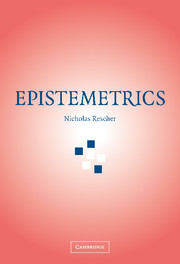Book contents
- Frontmatter
- Contents
- Preface
- 1 Asking for More Than Truth: Duhem's Law of Cognitive Complementarity
- 2 Kant's Conception of Knowledge as Systematized Information
- 3 Spencer's Law of Cognitive Development
- 4 Gibbon's Law of Logarithmic Returns
- 5 Adams's Thesis on Exponential Growth
- 6 Quality Retardation
- 7 How Much Can Be Known? A Leibnizian Perspective on the Quantitative Discrepancy Between Linguistic Truth and Objective Fact
- 8 On the Limits of Knowledge: A Kantian Perspective on Cognitive Finitude
- Conclusion
- Bibliography
- Index of Names
7 - How Much Can Be Known? A Leibnizian Perspective on the Quantitative Discrepancy Between Linguistic Truth and Objective Fact
A Leibnizian Perspective on the Quantitative Discrepancy Between Linguistic Truth and Objective Fact
Published online by Cambridge University Press: 06 August 2009
- Frontmatter
- Contents
- Preface
- 1 Asking for More Than Truth: Duhem's Law of Cognitive Complementarity
- 2 Kant's Conception of Knowledge as Systematized Information
- 3 Spencer's Law of Cognitive Development
- 4 Gibbon's Law of Logarithmic Returns
- 5 Adams's Thesis on Exponential Growth
- 6 Quality Retardation
- 7 How Much Can Be Known? A Leibnizian Perspective on the Quantitative Discrepancy Between Linguistic Truth and Objective Fact
- 8 On the Limits of Knowledge: A Kantian Perspective on Cognitive Finitude
- Conclusion
- Bibliography
- Index of Names
Summary
(1) Propositional knowledge is a matter of textualization that hinges on linguistic realizability. (2) As Leibniz realized, this imposes limits. (3)–(6) While statements (and thus truths and realizable knowledge) are enumerable, actual objective facts are not, for there is good reason to think that facts are inexhaustible and nondenumerable. (7) Accordingly, there are more facts than truths: reality bursts the bounds of textualization. (8)–(9) There are various facts that we finite beings cannot manage to know. (10)–(11) There is no warrant for the view that reality as such answers to what we can know of it.
How Much Can a Person Know? Leibniz on Language Combinatorics
Gibbon's Law holds that the extraction of knowledge from mere information becomes exponentially more demanding in the course of cognitive progress. However, while finite resources will doubtless impose limits in practice, the process is one which in theory and principle goes endlessly on and on. Does this mean that there really are no theoretical limits to the enlargement of knowledge?
To this point, the book's deliberations have dealt with knowledge in relation to what people know. But above and beyond what is known there is also the issue of what is knowable.
How much can someone possibly know? What could reasonably be viewed as an upper limit to an individual's knowledge – supposing that factually informative knowledge rather than performative how-to knowledge or subliminally tacit knowledge is at issue?
- Type
- Chapter
- Information
- Epistemetrics , pp. 73 - 94Publisher: Cambridge University PressPrint publication year: 2006



